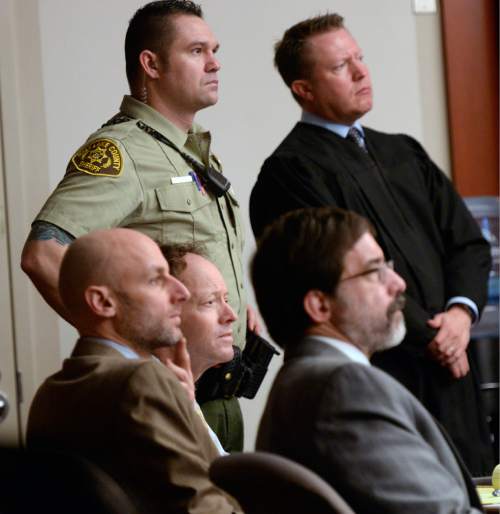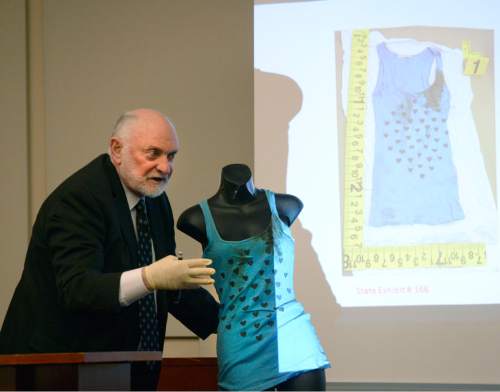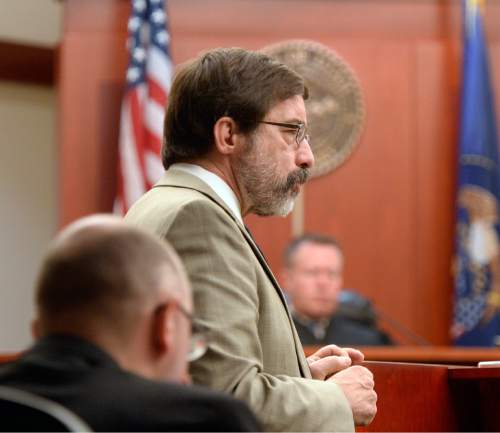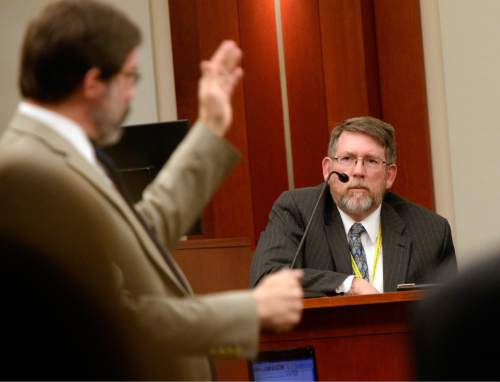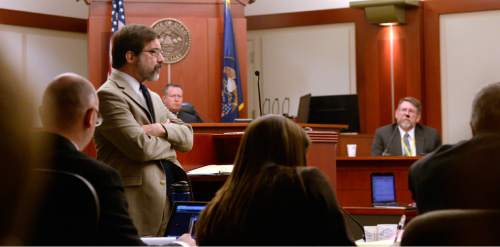This is an archived article that was published on sltrib.com in 2015, and information in the article may be outdated. It is provided only for personal research purposes and may not be reprinted.
In an effort to show jurors that Uta von Schwedler was not suicidal before her 2011 death, prosecutors on Tuesday called the woman's physicians to testify during the second week of her ex-husband's murder trial.
Dr. Jennifer Bell, who treated von Schwedler from 1998 to 2009, and Dr. Richard Backman, von Schwedler's physician from 2009 until her death, testified that the woman was never severely depressed and never talked about having suicidal thoughts.
"[We] never talked about her being hopeless," Bell testified. "There was always something she was looking forward to, travel or camping. She expressed sadness at times, but I never heard hopelessness."
Prosecutors have accused von Schwedler's ex-husband, John Brickman Wall, of killing the 49-year-old woman one September night in 2011 following years of contention involving a messy divorce and a custody battle over their four children.
Wall's attorneys have told jurors that the woman's drowning death was likely a suicide or an accident.
Wall, a 51-year-old former Salt Lake City pediatrician, is charged in 3rd District Court with first-degree felony murder.
Von Schwedler's boyfriend, Nils Abramson, found her submerged in cold water in a bathtub in her Sugar House home on the night of Sept. 27, 2011. She was wearing only shorts, and there was blood in her bedroom, at the edge of the bathroom sink and on a windowsill, according to an autopsy report.
The woman also had a fatal or near-fatal amount of the anti-anxiety medication Xanax in her system, according to court records.
Both Bell and Backman testified that they never prescribed von Schwedler with the medication, and she never asked for it or any other anti-anxiety medicine.
Assistant Medical Examiner Erik Christensen said Monday during his testimony that how the medication got into von Schwedler's body was a "confounding issue" — one that left him unable to declare the woman's drowning a homicide or a suicide.
Christensen testified that there were no pill fragments found in von Schwedler's stomach and there were no needle markings to indicate she had been injected with the drug.
"If she had no Xanax in her system, I would have certified this death as a homicide," he said Monday, telling jurors that he listed von Schwedler's manner of death as "undetermined."
The woman's cause of death was drowning, he said.
Christensen also testified that the woman had a bruise on her lip, three cuts on her left wrist and a slice on one leg.
The wrist wounds consisted of a slicing injury, a stabbing injury and one that was like a scratch from sharp object, he said.
"They appear certainly more defensive to me than self-inflicted," Christensen said of the wrist injuries.
While questioning Christensen, prosecutor Anna Rossi suggested von Schwedler could have been injected with Xanax into her wrist — the needle mark then being covered by one of the knife wounds. But Christensen said under cross-examination that Xanax is "very insoluble."
Defense attorney G. Fred Metos suggested that it would be difficult to dilute the anti-anxiety medication and it would require a large needle for injection. He also suggested that a person would likely fight off an unwanted injection, and pointed out that there was no bruising to suggest von Schwedler was restrained.
But Dr. Scott Denton, a pathologist hired by prosecutors to review the case, testified Monday that he believes von Schwedler was injected with Xanax and may have been forced to swallow some of the medication.
He pointed to the stab wound on von Schwedler's wrist, saying it was concerning that there was heavy bruising around a superficial wound. He said the bruising could have come from a needle injection. Denton also said bruising on von Schwedler's lip could have been caused by pressure to the area, such as someone forcing her to drink from a cup.
Denton said he agreed with the Utah medical examiner's conclusions that von Schwedler died from drowning, but he said he believed her manner of death was a homicide.
Attorney Melissa Bean, who represented von Schwedler in family law issues for several years before her death, testified on Tuesday that her client and Wall argued over the years about their children, money and scrapbooks that von Schwedler had made.
Bean said that in the months before her death, von Schwedler was seeking a custody re-evaluation. Wall had primary custody of the four children, and von Schwedler paid child support to her ex-husband, Bean said.
Jurors were shown emails sent between Bean and von Schwedler, and between von Schwedler and Wall, that showed the volatile nature of the couple's relationship and their struggles to see eye-to-eye on what bills von Schwedler should pay, where the children should spend their time and how the couple's belongings — including the scrapbooks — should be divided among them.
"The parties did not get along well," Bean testified.
One of those scrapbooks — containing photos of her youngest child — was found floating at her feet when her boyfriend discovered her in the bathtub. A paring knife was also found under her body.
On the evening after his ex-wife's body was found, officers questioned Wall for four hours, insisting, at times, that Wall had killed von Schwedler. When police asked Wall about scratches on his forearms and why one of his eyes was bleeding internally, he claimed "the dog stepped on him" the previous night, according to court documents.
Wall told the officers — and later other friends and family — that if he did do it, he didn't remember.`Witnesses later told police that when Wall returned home after the police interview, he was "upset, mentally unstable and threatening suicide," according to a search warrant affidavit.
Before he was taken to a mental-health facility, Wall told a witness that whoever had killed von Schwedler was a "monster," and he added, "If it was me, I don't remember," the affidavit says.
Wall was originally charged in April 2013 with murder and first-degree felony aggravated burglary. Prosecutors dismissed the aggravated burglary count last week prior to jury selection.
Wall faces up to life in prison if convicted. He has been held in the Salt Lake County Jail in lieu of $1.5 million cash-only bail.
He has signed an agreement with the Division of Occupational and Professional Licensing, giving up his medical license and his ability to write prescriptions until the murder case is resolved.





